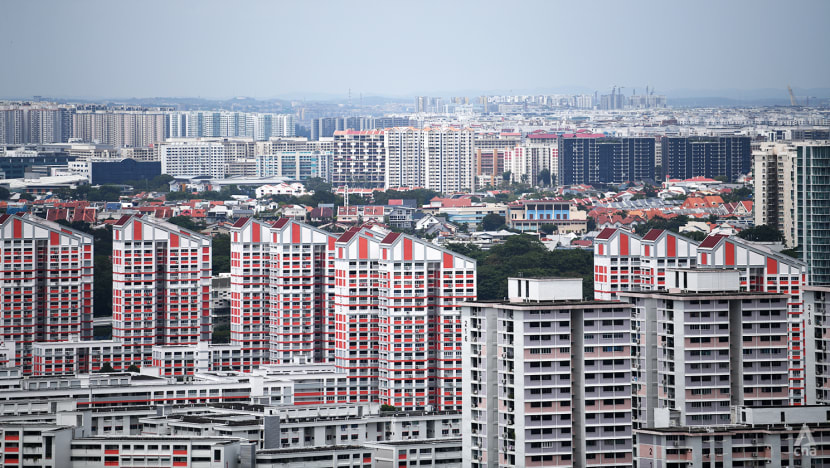Commentary: Should first-time buyers in Singapore time their property purchases?
The Singapore property market appears to be turning the corner, so should first-time buyers continue with their planned purchases, or wait longer to see if prices fall further? IREUS professor Qian Wenlan lays out the considerations.

HDB flats and private properties in Singapore. (Photo: CNA/Calvin Oh)
SINGAPORE: The bullish property market may finally be showing signs of stabilising. Flash estimates from the Housing and Development Board show that HDB resale prices grew 0.9 per cent in the first quarter of 2023, the smallest increase in the last 10 quarters.
The February Build-to-Order (BTO) exercise also saw the lowest number of applicants in three years. First-timers who participated in that exercise stand a good chance of being invited to book a unit.
Home prices have remained on the uptrend despite uncertain economic conditions brought on by the Ukraine war and central banks raising interest rates. Rents likewise skyrocketed, and have only recently begun to show early signs of softening.
Over the course of the pandemic and the disruptions it caused, demand for housing has outstripped supply. To address the supply-demand imbalance, the government committed to launching up to 100,000 BTO flats by 2025 if needed.
In 2022, more than 22,000 flats were completed, representing a substantial 15 per cent year-on-year increase, and as of March 2023, the HDB has completed about 60 per cent of delayed BTO projects.
As the supply of new developments accelerates and meets pent-up demand, the market appears to be turning the corner. How should homebuyers, especially first-timers respond? Should they continue with their planned purchases, since they now enjoy higher chances of securing a home within a shorter period? Or should they “time” the market, and wait longer to see if prices fall further?
SUPPLY-DEMAND DYNAMICS DO NOT STRICTLY APPLY TO BTO PROJECTS
Unlike the HDB resale market and private homes, BTO flats are priced with affordability as the primary consideration and are influenced by household incomes, mortgage servicing ratios and selling prices of comparable resale units.
In a media statement in December last year, the HDB clarified that BTO pricing was separate and independent of the project’s development cost and that it did not “apply a profit margin on costs”.
With such an affordability-driven approach, supply-demand dynamics do not strictly apply to BTO projects. Flexible subsidy schemes - which are typically more generous for first-timers - counteract market fluctuations, and keep prices stable and within reach of the majority.
This being the case, first-timers who are seeking BTO flats - especially those with urgent housing needs - ought to proceed with their purchases, but with the caveat that they should carefully work out their long-term debt obligations if they are taking out mortgage loans from commercial banks.
RISING COSTS OF FINANCING A HOME
Homebuyers taking out mortgage loans here should err on the side of caution, and proceed with the premise that interest rates will continue to rise in the near future.
In late March, the US Federal Reserve raised the interest rate by another 25 basis points, taking the federal funds rate to between 4.75-5.00 per cent. While there were suggestions that the Fed rate hikes were in the tail end, there is still quite a way to go before US domestic inflation cools down to the targeted 2 per cent.
Rising interest rates, taken in conjunction with soaring inflation, present a double whammy where the cost of credit increases even as the cost of living becomes more expensive. This in turn erodes the value of real wages.
In IREUS’ most recent Real Estate Sentiment Index (RESI) survey, developers and senior real estate professionals highlighted rising inflation and interest rates as the top risk that may adversely impact the market.
Today, a three-bedroom condominium in the Outside Central Region is typically upwards of S$1 million (US$750,000). Assuming a loan of S$750,000 taken out for a S$1 million home based on a 25-year loan tenure, an increase of 1 per cent above the current prevailing rate translates to an increase of over S$400 for monthly debt repayment.
These estimates are relatively conservative, so in reality, homeowners could be forking out more than the estimated S$400 per month if interest rates rise.
At first blush, the heavier debt repayment amount may not seem prohibitive. However, homebuyers should bear in mind that housing is but one of the many expenses for a household. With inflation driving up prices, increased costs of goods and services will add up and may eventually pose a substantial burden.
HOW WILL PRICES PAN OUT?
Data from IREUS’ Singapore Residential Price Index suggest that, compared to 2021, the rate of price increase for private homes in 2022 has decelerated somewhat, and there are early signs in the market that prices have started to soften.
In October last year, the resale price of non-landed private homes fell by 0.7 per cent month-on-month after staying on an upward trajectory for nearly two years.
This observation is corroborated by the findings of IREUS’ RESI survey. In the most recent poll, about 71 per cent of developers felt that prices would remain stagnant. That was in stark contrast to the preceding survey when only 33 per cent thought that prices would stabilise.
Moreover, only 29 per cent of developers anticipated prices to rise in 2023, which was 28 percentage points lower than the 57 per cent observed in the earlier survey. On the whole, developers displayed a more conservative stance which reflected slowing buyer sentiment amid higher market risks.
Homebuyers with ample liquidity and financial reserves may consider proceeding with their purchases, especially since a substantial number of new launches are expected for 2023. Well-built properties in choice locations, with good neighbourhood amenities, will build up ample home equity over time - which will be reflected in resale prices, thus allowing owners to recoup money from their initial purchase.
However, those looking for private homes above S$1.5 million will have to factor in the higher Buyer’s Stamp Duty which took effect on Feb 15.
On the other hand, homebuyers who are more highly leveraged with other loans and financial commitments may want to observe further or consider public housing options.
Qian Wenlan is the Ng Teng Fong Chair Professor in Real Estate and professor of finance and real estate at the NUS Business School, Director of the Institute of Real Estate and Urban Studies (IREUS), National University of Singapore. The views in the op-ed are the author's and do not represent the views of NUS and its affiliates.


















